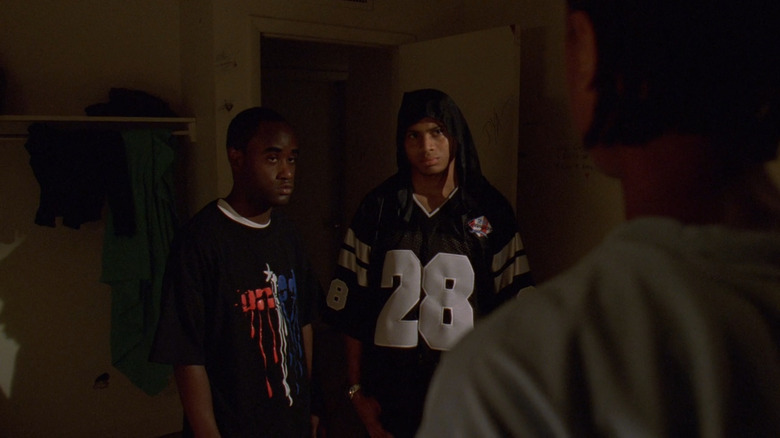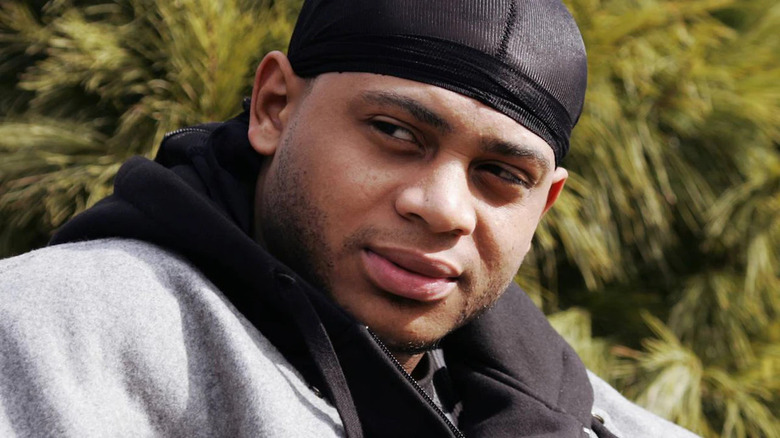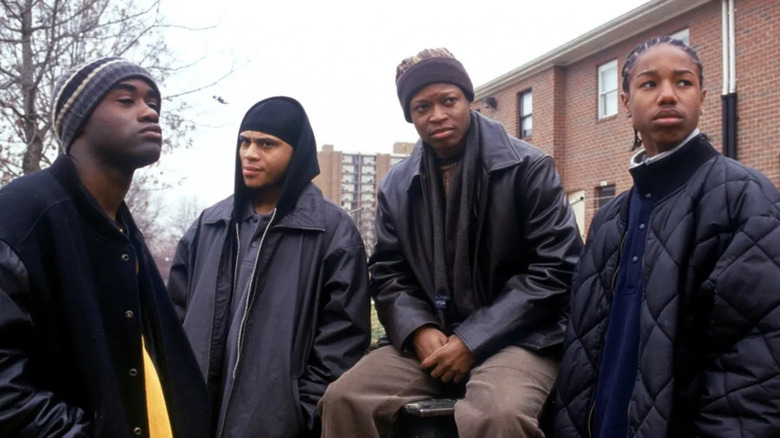One Of The Wire's Most Powerful Moments Was Set Up Seasons In Advance
In a landscape where so much TV is released in the form of a one-off miniseries or a couple of short seasons, there's something to be said for the wonders of a show like "The Wire." Its episode count was still low compared to the norm on network TV at the time, but its longform nature allowed all its characters to evolve in organic ways over time without ever feeling forced.
The series takes place from 2002 to 2008, and by season 5, it really does feel like six years have gone by for all these characters. Even if there's no major catalysts marking their growth, the characters still get to mature as any real person would as the years go by. One such character was Preston "Bodie" Broadus (J.D. Williams), who started off the show as a young, hardened gangster who did not hesitate to commit acts of violence whenever necessary. Really, the only time he hesitated was in season 1's penultimate episode, "Cleaning Up," where he was ordered to murder his friend Wallace (Michael B. Jordan), who was suspected to have been a snitch.
Bodie's moment of doubt
Although Bodie goes through with the murder, he notably hesitates. It's only after his accomplice Poot urges him to hurry up and do it already that he finally pulls the trigger. Bodie's reluctance to kill Wallace would be first step in his evolution as a character, in which he slowly realizes that the game's rigged against him, that it's only the people higher up in the chain who benefit from Bodie doing this kind of dirty work. By the time of Bodie's death in the season 4 finale, he'd grown to be someone whose loss the audience would truly mourn. As culture writer Brett Martin put it:
"Broadus would emerge as the drug game's answer to the rogue detective Jimmy McNulty: a soldier who tries to make his own way and ends up ground down by the system."
The decision to have Bodie hesitate, however, was originally objected to by co-creator Ed Burns, who considered season 1 Bodie to be so hardened by this point that it was out of character for him to hesitate as he does here. "It didn't go with the character," Burns said, reflecting on his feelings at the time. "Bodie was a borderline psychopath almost. I was like, 'We're leading the audience down this path, and now this guy is backing off?' That's f***ed up. That's bulls***."
Ed Burns' change of heart
After season 4, however, Burns had long since come around to the idea that Bodie's moment of doubt was necessary:
"What it did was it allowed for a wonderful dynamic that went on for four seasons. It brought out a lot of comedy that psychopaths don't have ... It was a learning curve for me. Originally I just didn't like it because you don't pull punches like that with the audience. Now, when I think about it, I think, 'This is cool. This is something that allowed for another dimension.' It worked. It worked fine."
Bodie was hardly the only character who became a lot more likeable as the show went on. On the police side of things, Officer Pryzbylewski (Jim True-Frost) went from one of the most detestable characters on the show to one audiences rooted for, even as he lacked that big moment of redemption you'd expect in a typical show.
One of the benefits of the series' slice-of-life style of pacing is that characters will often quietly improve themselves in the background of an episode, given little humanizing moments that don't call too much attention to themselves but still make an impact. These are the sort of subtle character arcs that are only really possible in a show that goes on for more than just a season or two. Although David Simon's many mini-series over the years are consistently amazing, his next project is hopefully a longform show like "The Deuce" or "The Wire." It's in those formats that his work truly shines.


